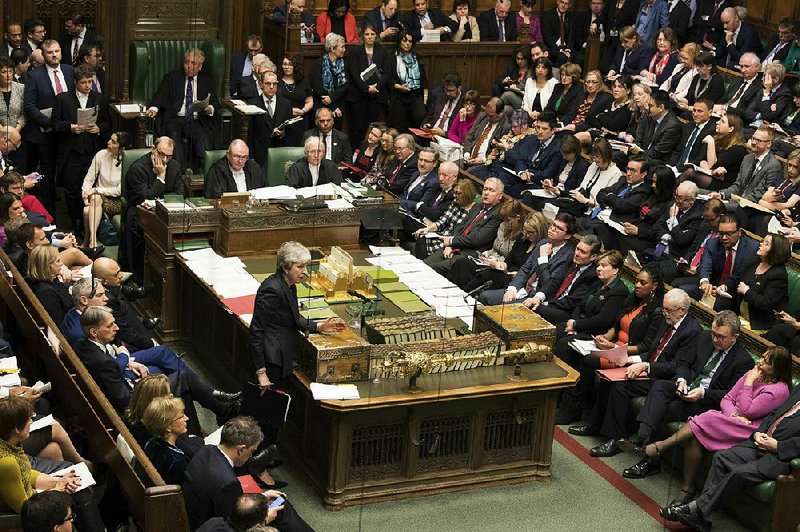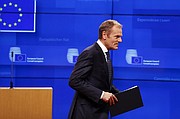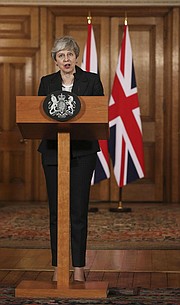LONDON -- Exactly 1,000 days after Britain voted to leave the European Union, and nine days before it is scheduled to walk out the door, Prime Minister Theresa May hit the pause button Wednesday, asking the bloc to postpone the U.K.'s departure until June 30.
EU leaders will only grant the extension if May can win the U.K. Parliament's approval next week for her twice-rejected deal. Otherwise, the U.K. is facing a chaotic "no-deal" departure from the bloc within days, or a much longer delay that May says she will not allow while she is in power.
May, who has spent two and a half years trying to lead Britain out of the EU, said it was "a matter of great personal regret" that she had to seek a delay to Britain's withdrawal.
In a televised statement, May said she shared the frustration felt by many Britons who have "had enough" of endless debates and infighting -- though she did not accept a role in causing it. Instead, she blamed Parliament for the deadlock and warned that if lawmakers did not back her deal, it would cause "irreparable damage to public trust."
"It is high time we made a decision," May said.
In a letter to European Council President Donald Tusk, May acknowledged that the process "clearly will not be completed before 29 March, 2019" -- the date fixed in law two years ago for Britain's departure.
May asked to delay Britain's withdrawal until June 30 and said she would set out her reasons to EU leaders at a summit today in Brussels.
Her plan is to hold a third vote in Parliament on her deal next week, then use the EU-granted extension to pass the legislation needed for an orderly departure from the EU.
"As prime minister I am not prepared to delay Brexit any further than June 30," May told the House of Commons.
Tusk said he thought a short delay "will be possible, but it would be conditional on a positive vote on the withdrawal agreement in the House of Commons."
May's request -- and Tusk's response -- leaves Britain and the bloc facing uncertainty right up to the deadline for departure. Withdrawing without a deal could mean huge disruptions for businesses and U.K. residents, as well as those in the 27 remaining EU countries.
"Even if the hope for a final success may seem frail, even illusory, and although Brexit fatigue is increasingly visible and justified, we cannot give up seeking until the very last moment a positive solution," Tusk said in Brussels.
Tusk made clear what other EU leaders have long hinted: The EU is unwilling to give Britain more time unless the government can find a way out of the impasse.
German Foreign Minister Heiko Maas said that "if the [EU] Council is to decide on extending the deadline for Britain, then we would like to know: Why, why, why?"
French Foreign Minister Jean-Yves Le Drian said a delay could only be granted if May guaranteed that its purpose "is to finalize the ratification of the deal already negotiated."
ANOTHER ATTEMPT
EU leaders are united in saying that the divorce deal it spent more than a year and a half negotiating with Britain can't be renegotiated.
But the deal has twice been rejected by hefty margins in Britain's Parliament amid opposition from anti-EU and pro-EU lawmakers.
May had planned to try again this week to get the agreement approved, until the speaker of the House of Commons ruled that she can't ask Parliament to vote on the deal again unless it is substantially changed.
May told Tusk that despite the ruling, "it remains my intention to bring the deal back to the House." She's likely to do that next week -- within days or hours of Britain's scheduled departure -- by arguing that circumstances have changed and the speaker's bar on a third vote no longer applied.
But she faces a struggle to overturn the huge margins of defeat for her deal in previous votes in January and last week.
Tusk did not say whether the EU would be willing to grant a long delay if Britain changed course and abandoned May's deal for a new approach.
British opposition politicians, and pro-EU members of May's Conservative government, have urged a longer extension, saying a delay of just a few months could leave the country facing a no-deal exit this summer.
They want to commit to a close post-exit economic relationship with the bloc to ease disruption for businesses and citizens.
Opposition Labor Party lawmaker Angela Eagle said May should "stop banging her head against the brick wall of her defeated deal" and seek cross-party support for a new exit strategy.
But a shift to a "soft Brexit" would infuriate the anti-EU wing of May's divided party, and a long delay would require Britain to participate in May 23-26 elections for the European Parliament.
May said postponing the withdrawal beyond June would result in Parliament spending "endless hours contemplating its navel on Brexit."
Any delay that required Britain to take part in European parliamentary elections would be a major headache for the bloc. Britain's seats already have been allocated to other countries to fill in the May election.
Britain believes it would not have to participate if it got a three-month delay, as the newly elected European Parliament is not due to convene until July. Some EU officials take a different view and want any extension to end by May 23, the first day of the European elections.
Many lawmakers blame May for the chaos surrounding Britain's departure, accusing her of weak leadership, a failure to seek consensus early on -- and a bad deal they fear could yoke Britain to EU rules and regulations forever.
On Wednesday evening, the prime minister doubled down. She stepped to the lectern outside 10 Downing Street to talk directly to the people.
"You, the public, have had enough," she said. "You are tired of the infighting. You are tired of the political games and the arcane procedural rows. Tired of [members of Parliament] talking about nothing else but Brexit when you have real concerns about our children's schools, our National Health Service, and knife crime. You want this stage of the Brexit process to be over and done with. I agree. I am on your side."
DONALD TRUMP JR.
Britain's political chaos drew some reaction across the pond from President Donald Trump's son.
In an op-ed in The Daily Telegraph on Wednesday, Donald Trump Jr. accused "the European elites" of trying to sabotage Britain's withdrawal from the EU. He put some of the blame on May and declared that "democracy in the U.K. is all but dead."
"Next Friday, March 29, is supposed to be the British people's Independence Day," Trump Jr. wrote. "But because the elites control London from Brussels, the will of the people is likely to be ignored."
During a visit to Britain last summer, the U.S. president told May to "sue the EU," according to her account of the meeting -- advice the prime minister dismissed in favor of negotiating.
According to Steve Bannon, the president's former chief strategist, Trump told the British leader to "overshoot the target" on her deal, be on "terms agreed within six months" and "use every arrow in your quiver even if you have to do litigation later."
"She laughed it off," Bannon told the British network Sky News on Monday.
"I gave the prime minister my ideas on how to negotiate it, and I think you would have been successful," the president said last week in a meeting with Ireland's prime minister, Leo Varadkar. "She didn't listen to that, and that's fine."
Because she didn't listen, the younger Trump wrote, "a process that should have taken only a few short months has become a yearslong stalemate." Such an outcome, he added, was "exactly as the European elites were hoping."
"Was it all a ruse?" Trump Jr. said of the government's vows to break from the EU. "Some pro-Brexit politicians even suggest that Mrs. May herself is trying to sabotage Brexit, by insisting that Parliament agree to a deal that essentially keeps Britain bound to the EU indefinitely."
In the op-ed, the president's son described both Britain's vote to withdraw and his father's election as victories over establishments that have since tried to "overturn their mandates."
"What we're seeing now in Washington, London and Brussels is the desperate, last-gasp attempt by those previously in power to cling on to what was once theirs in the face of an overwhelming mandate for change," he said.
Information for this article was contributed by Jill Lawless, Lorne Cook, Raf Casert, Samuel Petrequin, Danica Kirka, Geir Moulson and Frank Jordans of The Associated Press; by William Booth, Michael Birnbaum, Quentin Aries and Karla Adam of The Washington Post; and by Palko Karasz of The New York Times.
A Section on 03/21/2019



